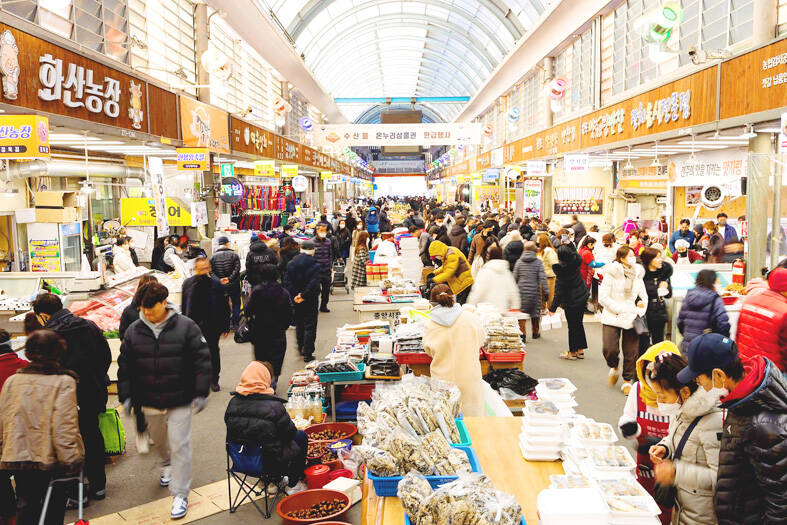South Korea’s gross national income (GNI) per capita last year fell behind Taiwan’s for the first time in 20 years due to the rapid depreciation of the won against the US dollar, the Bank of Korea said in a report yesterday.
South Korea’s GNI per capita dropped 7.7 percent to US$32,661 last year, compared with Taiwan’s GNI per capita of US$33,565, the report said.
Unlike GDP, which measures the value of production in a country, GNI refers to the value of GDP plus the net income earned by its nationals, whether domestically or abroad. GNI is used to gauge the average income of a country.

Photo: Bloomberg
The 13 percent depreciation of the won against the greenback last year led to a decline of 8.1 percent in South Korea’s US dollar-denominated GDP, causing the nation’s GNI to retreat from a year earlier, the Bank of Korea said.
However, if denominated in won, South Korea’s GDP rose 3.8 percent year-on-year last year, and its GNI per capita rose 4.3 percent annually to 42.2 million won, the central bank said.
TAIWAN’S PERFORMANCE
The New Taiwan dollar last year depreciated 6.8 percent against the US dollar — much less than the won’s decline.
Taiwan’s and South Korea’s GNI grew at a similar pace of about 4 percent last year in local currency terms, the central bank said.
In 2021, Taiwan’s GNI per capita was US$34,756, lower than South Korea’s US$35,373, the report said.
Taiwan’s NT dollar-denominated GNI per capita expanded 5.6 percent to NT$999,125 last year, similar to Taiwan’s GDP per capita, which increased 5.4 percent to NT$976,914, Directorate-General of Budget, Accounting and Statistics said.
The agency forecast that Taiwan’s GNI per capita would grow 2.1 percent this year to NT$1.02 million.

KEEPING UP: The acquisition of a cleanroom in Taiwan would enable Micron to increase production in a market where demand continues to outpace supply, a Micron official said Micron Technology Inc has signed a letter of intent to buy a fabrication site in Taiwan from Powerchip Semiconductor Manufacturing Corp (力積電) for US$1.8 billion to expand its production of memory chips. Micron would take control of the P5 site in Miaoli County’s Tongluo Township (銅鑼) and plans to ramp up DRAM production in phases after the transaction closes in the second quarter, the company said in a statement on Saturday. The acquisition includes an existing 12 inch fab cleanroom of 27,871m2 and would further position Micron to address growing global demand for memory solutions, the company said. Micron expects the transaction to

Nvidia Corp’s GB300 platform is expected to account for 70 to 80 percent of global artificial intelligence (AI) server rack shipments this year, while adoption of its next-generation Vera Rubin 200 platform is to gradually gain momentum after the third quarter of the year, TrendForce Corp (集邦科技) said. Servers based on Nvidia’s GB300 chips entered mass production last quarter and they are expected to become the mainstay models for Taiwanese server manufacturers this year, Trendforce analyst Frank Kung (龔明德) said in an interview. This year is expected to be a breakout year for AI servers based on a variety of chips, as

Global semiconductor stocks advanced yesterday, as comments by Nvidia Corp chief executive officer Jensen Huang (黃仁勳) at Davos, Switzerland, helped reinforce investor enthusiasm for artificial intelligence (AI). Samsung Electronics Co gained as much as 5 percent to an all-time high, helping drive South Korea’s benchmark KOSPI above 5,000 for the first time. That came after the Philadelphia Semiconductor Index rose more than 3 percent to a fresh record on Wednesday, with a boost from Nvidia. The gains came amid broad risk-on trade after US President Donald Trump withdrew his threat of tariffs on some European nations over backing for Greenland. Huang further

HSBC Bank Taiwan Ltd (匯豐台灣商銀) and the Taiwan High Prosecutors Office recently signed a memorandum of understanding (MOU) to enhance cooperation on the suspicious transaction analysis mechanism. This landmark agreement makes HSBC the first foreign bank in Taiwan to establish such a partnership with the High Prosecutors Office, underscoring its commitment to active anti-fraud initiatives, financial inclusion, and the “Treating Customers Fairly” principle. Through this deep public-private collaboration, both parties aim to co-create a secure financial ecosystem via early warning detection and precise fraud prevention technologies. At the signing ceremony, HSBC Taiwan CEO and head of banking Adam Chen (陳志堅)